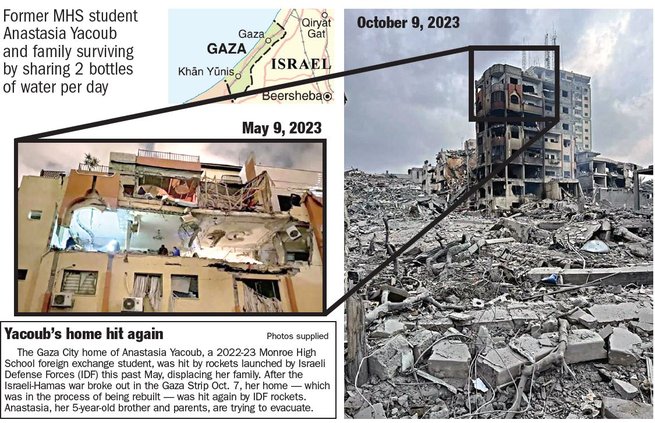MONROE — Unable to shelter, former Monroe High School student Anastasia Yacoub and her family are in survival mode in the Gaza Strip, as the bloody war between Hamas and Israel shows little signs of stopping.
“I have only been staying in a place so called ‘shelter’ which is a lie if you hear on the news,” Anastasia wrote to the Times in an email Oct. 17, the 10th day of the war. “There’s NO SHELTER, NO SAFE PLACE in Gaza.”
Yacoub was a sophomore foreign exchange student this past school year. Her home was destroyed by Israeli Defense Force (IDF) rockets back in May, just four weeks before her stay in America ended. When she returned home, she and her family stayed at a friends’ house.

Last point of contact with Anastasia Yacoub: 1 p.m. CST, 10/19/2023
As of press time on Oct. 19, 2023
After Hamas’ surprise attack on Israel, which killed more than 1,400 people and led to nearly 200 hostages, Israel launched a counteroffensive through the air. In the first 10 days, nearly 10,000 IDF bombs flew into the Gaza Strip, an enclosed pocket of Palestine southwest of Israel. The area has among the highest population densities in the world, with about 2.3 million civilians in an area about 1/4 the size of Green County.
The Yacoubs had been rebuilding their previously damaged house, only for it to be hit again on Oct. 9. Worse yet, the entire neighborhood was obliterated into a gray landscape of rubble.
“A lot of bombing (sic) are very close to us. When we were at our house before evacuating, they bombed an apartment right next to us,” Anastasia said.
When Israel launched its counteroffensive, officials publicly announced the IDF would “wipe Gaza off the map” — a suggestion that is against the Geneva Convention and widely considered a war crime itself.
Among the tactics taken by Israeli officials was shutting off supplies of water, food, fuel, electricity — lifeline resources — which is also considered a war crime by the United Nations.
Egypt had closed its border crossing with Gaza — one of just three crossings out of Gaza, which is surrounded by walls on three sides of the territory, and the Mediterranean Sea to the west.
“Everybody is waiting for the Egyptian borders to open, however we have been waiting since the war started,” Anastasia said. “We also have some foreigners including Americans stuck in here but are not able to leave due to the Egyptians not opening the border. We want to leave Palestine. Everyone does but we’re not able to. Now everything has been cut off.”
The city is short in drinking water. We can’t find water anywhere and are trying to save up by drinking two bottles a day with four family members.Anastasia Yacoub
On Thursday, Oct. 19, the United Nations (U.N.) said that humanitarian aid and supplies would be delivered to Gaza on Friday, Oct. 20 through the southwestern Rafah border crossing with Egypt. Optimism for those on the ground still wasn’t high, however.
“The supplies coming in are for the refugees located in south of Gaza in UNRWA shelters and homeless people like us. We are in the South but we have no idea how it will be distributed or who’s in charge. Mostly this will go to hospitals, UNRWA schools basically shelters,” Anastasia said.
According to Anastasia, the Yacoubs were down to an average of just two bottles of water between the four family members, which includes her 5-year-old brother, Alexander.
“The city is short in drinking water. We can’t find water anywhere and are trying to save up by drinking two bottles a day with four family members,” Anastasia said.
As of Oct. 19, it was estimated that more than 3,800 Palestinians had been killed in and 12,000 wounded in the conflict. There is not enough grave sites or other locations to store the dead, and it was reported this past week by Reuters that many of the dead are being stacked into containers and ice cream trucks.
This story is a follow-up from a piece that ran Saturday, Oct. 14, 2023:
Stuck in a war zoneFormer MHS foreign exchange student Anastasia Yacoub caught in ‘worse than a nightmare’ situation in Palestine as most recent Middle East fighting is underway
Palestinians attempting to head to the southern end of the 25-mile long Gaza Strip have to traverse across dangerous rubble from fallen buildings, other injured civilians and dead bodies. Not only that, IDF rockets have, on multiple occasions, bombed the very route it suggested Palestinians take when attempting to flee.
“Israel told 1.1 million Palestinians to leave their homes. Then the Israeli army bombed the road that they said was a ‘safe route’,” Anastasia said. “We see death in our eyes every day. The hundreds injured may die soon as Israel is still refusing to allow aid, including medical supplies. This is a grave war crime.”
The shortage of water has reached its breaking point, as the international community fears further death due to dehydration and unsanitary water, whether salt water from the Mediterranean Sea or from contaminated wells under the ground. Palestine’s desalination plant, which can convert salt water to drinking water, is among the casualties from the lack of fuel.
Communication to the outside world is also limited. Israel shut off Gaza’s internet, and cell service is spotty at best. Anastasia and her best friend search the streets for cell phone signals in order to access social media apps and contact friends and family — including those overseas. They have portable solar chargers to keep their phones operational.
“We don’t have internet at all now. We don’t have water, electricity, nor internet. We are on solar electricity, thank god,” she said.
In 1947, the UN proposed a two-state solution for the area: a Jewish state and an Arab state, with Israel home of the Jews and Palestine, the Arabs. However, Israel has continued to spread over the past half century. Palestine is recognized as its own country by 138 of the 193 members of the UN, though not by the United States.


Israel essentially occupies the Palestinian territory, with Israeli settlements and military control of the streets. Similar to the American South during the Jim Crow-era, Palestinians are barred from walking on certain streets and have even had their front doors welded shut to keep them away from the streets. Those slew of restrictions on Palestinian civilians is key to why Amnesty International considers it an apartheid state.
At the start of the current conflict, leaders in Ireland and Scotland quickly jumped on the side of peace, but also put itself 100% behind Israel, like the U.S. did. Instead, Ireland and Scotland have given their support to the Palestinian civilians — but not Hamas. Similar to Palestine, Ireland and Scotland had their homelands confiscated by the British Empire, and also faced plights of war, food shortages and displacement throughout their histories. Once occupied by Britain, the region had arbitrary and contested new borders drawn after the end of WWII. Palestine’s land soon began to shrink as an influx of Zionists began immigrating and taking over Palestinian land and taking over control.
Zionism is a Jewish nationalist movement that has had as its goal the creation and support of a Jewish national state in Palestine, the ancient homeland of the Jews, according to Encyclopedia Britannica. Though Zionism originated in eastern and central Europe in the latter part of the 19th century, it is in many ways a continuation of the ancient attachment of the Jews and of the Jewish religion to the historical region of Palestine, where one of the hills of ancient Jerusalem was called Zion.
Hamas took over control of Palestine during a 2007 election, collecting 44.45% of the vote. No elections have been held since. About 80% of today’s Palestinian population was either too young or not yet born when Hamas took over power. More than 70% of civilians in Gaza are under 25 years old, including nearly 50% under age 16.


Hamas is a Sunni Islamist political party and military organization, mostly centered in Gaza City. It was designated as a terrorist organization by the U.S. in 1995, Canada in 2002, the European Union in 2003, and the UK in 2021.
The current war has captured the attention of the entire world. The UN Security Council passed a resolution that would have called for “humanitarian pauses” in order to deliver lifesaving aid to millions in Gaza. Of the 15 countries represented on the council, 12 voted in favor, while Russia and the United Kingdom abstained. The lone country to vote against it was the U.S., which, as a permanent member of the UN Security Council, has full veto power. China, France, Russia and the UK are also permanent members of the council.
“A ‘no’ vote from any one of the five permanent members of the Council stops action on any measure put before it,” according to the UN’s website.
Anastasia said that she, like many Palestinians, feel abandoned by the world.
“It breaks our hearts how nobody is doing a thing. How when Israelis say it was an accident, bombing killing and injuring more than a thousand people, they still get a pass from the world?” Anastasia rhetorically questions. “Nobody is doing anything, this shows us how cruel the world is. We literally — including myself — don’t have hope of anyone helping us but to keep praying.”


